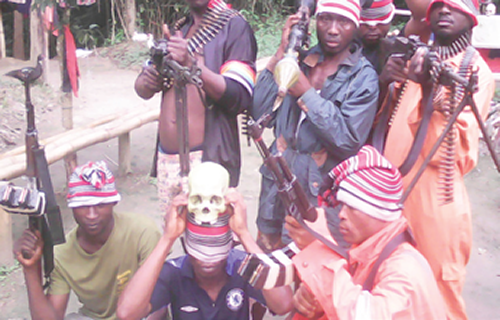
By Ulf Laessing and Libby George
LAGOS/LONDON, Nigeria (Reuters) – An angry crowd blocks access to a Chevron facility in Nigeria’s oil-producing south to demand jobs and housing, a common refrain from poor communities in the Niger Delta swamps.
But this incident in August was different. The young men were not just angry with the U.S. company. They were also claiming that rival factions in their community were being given an unfair share of development funds from the oil industry.
The incident shows what the government must address when it meets community leaders and militants in Abuja next week in an attempt to end armed attacks on oil facilities in the Niger Delta, which reduced oil output by a third earlier this year.
Officials hope the meeting – which will be attended by President Muhammadu Buhari – will lead to an agreement for militants to lay down their arms in exchange for funds for the region that produces most of Nigeria’s oil.
But divisions between the militant groups and the communities where they live, as well as disputes among different groups of residents, will make it hard to reach a deal.
Community leaders warn that if they do not receive development funds, it will be hard to keep their jobless young men away from the militant groups.
An amnesty in 2009 between the previous government and the militants provided about $300 million a year in cash payments and job training to stop the fighters blowing up pipelines.
But much of the money ended up in the pockets of the militants’ leaders, known as “generals”. This made them rich and favoured their ethnic groups and villages, while angering those left out of the spending spree.
DEVELOPMENT PROGRAMME
The issued bubbled to the surface during the two-week protest at Chevron in August, as the unemployed demonstrators demanded access to a development programme funded by the U.S. firm that has benefited other areas.
“The oil producing communities were having rivalry among themselves,” said Thank-God Seibi, special assistant to the Delta state government. “They had a power tussle on who controls … Chevron’s community development strategy embracing all the oil producing communities.”
Chevron, like other oil companies in Nigeria such as Royal Dutch Shell, ExxonMobil and ENI, aims to help local communities benefit from the oil wealth. Winning the loyalty of local people is vital, as those who feel left out often allow militants to hide in the network of creeks around their Delta villages.
But the oil companies are wary of money disappearing into the pockets of generals or local leaders. Chevron puts cash into accounts from which only a company executive and an official appointed by local communities can withdraw funds after agreeing on where, for example, a road will be built.
At the Chevron protest, one group of local people wanted to nominate a point person who could have a say in where the development funds went, forcing the Delta state government to mediate between rival factions.
Community leaders said oil companies made payments or gave contracts to some local groups but not others.
“When such a development becomes known to the others it becomes a source of conflict resulting in agitations,” said youth leader Oweikeye Endoro.
Chevron said it had spent more than one billion naira ($3 million) on a housing project for the Ugborodo community, to which the protesters belong, and awarded contracts worth more than $1 billion to community members for a gas project alone.
The oil firm said its Ugborobo development scheme was compromised by a “perennial internal leadership crisis, with different factions jostling for power”.
OIL SLUMP
Elizabeth Donnelly, deputy head of the Chatham House Africa Programme, said it would be more difficult for the government to pay off militants as it did in 2009, as the slump in oil revenues meant the government did not have money to spare.
“Expectations of what can be achieved in negotiations at this stage should not be high,” she said.
Even if the government were flush with cash, there are 40 ethnic groups seeking development funds, and traditional leaders are struggling to control jobless young men who could end up joining the militants, residents say.
“The Delta and the spread of its people is so wide and huge, the biggest disparity is going to be, who are the people the government will continuously engage with to get a comprehensive resolution,” said Kola Karim, chief executive of Shoreline, a local oil firm whose pipelines have been attacked.
“There are a lot of different groups springing up.”
Militant attacks began in January after officials tried arresting a “general” on corruption charges. The violence reduced production to around 1 million barrels per day, the lowest in 30 years.
The government persuaded the most active group, the Niger Delta Avengers, to agree a ceasefire in August, allowing output to rise to 1.9 million barrels per day this week.
The Avengers operate out of the heartland of the biggest ethnic group, the Ijaw, which has benefited more than others from the 2009 amnesty, and resumed attacks this week.
But even during the “ceasefire”, another group called Greenland Justice Mandate emerged, saying it acted on behalf of smaller groups left out of the previous amnesty.
The group claimed several attacks and warned Shell against reopening a pipeline blown up by the Avengers in February. “Please go ahead (and) restart the facility and see what will happen. Enough said,” it said in a statement.
Chatham House’s Donnelly said there was a risk of “ugly violent conflict” between competing militant groups.
Oil firms are well aware that their pipelines and storage tanks are vulnerable in the creeks, where attackers can easily disappear despite a stronger military presence.
“The reality across the board for all major oil companies is continued vigilance, Karim said.
($1 = 314.5000 naira)
(Additional reporting by Anamesere Igboeroteonwu and Tife Owolabi; editing by Giles Elgood)

